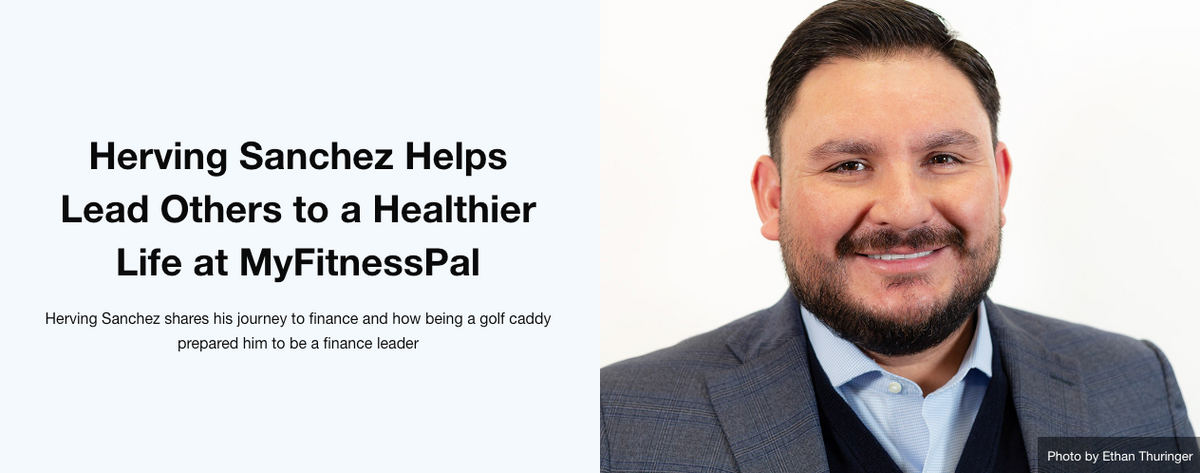Below is an article originally written by Noah Johnson. Go to MyFitnessPal's company page on PowerToFly to see their open positions and learn more.
In 2006, Herving Sanchez and his family had to foreclose on his childhood home. Sanchez, a Mexico native who grew up in Round Lake Beach, Illinois, still remembers when the harsh decision was made.
“I was sitting down with [his dad], and we were just working through the budget,” recalls Sanchez, who was a sophomore in college at the time. “It was something that really impacted me. Losing the home you grew up in is a process that makes you feel helpless.”
That experience helped influence him to study business with a concentration on accounting and eventually became a financial planning and analysis leader at the likes of Zebra Technologies, Under Armour, and currently, MyFitnessPal.
While the foreclosure fueled the hunger he’d need to excel in his career, he believes that the most valuable lessons he learned came from his first job as a golf caddy. While some associate caddying with carrying bags and clubs while drudging from one hole to the next on a long golf course, it actually involves much more, Sanchez says.
“You keep score, so you’re always looking back. You play a role in decision-making by looking at what club to use, what the wind is doing and what the air temperature is to approximate the most successful play you can have,” he says. “You’re helping to keep the golfer engaged in the round to be successful and potentially shoot the best round they ever had.”
He continues, “Being a caddy also put me in front of executives and professional athletes. Being around them helped me realize that they are pretty normal people and when you help them with something they struggle at, you create partnerships that allow you both to succeed.”
As he became a financial business partner, he found that his role was no different. Just as he had turned to the air temperature and wind speeds to predict a successful play, he created financial models to drive forecasting accuracy at Zebra Technologies, where he supported all the company’s backend functions and corporate development. Similar to the way he engaged his golfers, he built relationships with IT and digital professionals at Under Armour, helping them manage budgets and present compelling business cases for the tools they needed.
In 2020, he brought that service-oriented leadership style to MyFitnessPal as a vice president of financial planning and analysis. While he ended up at MyFitnessPal as part of the acquisition of the company by Francisco Partners, he stayed because of a strong team and mission.
“Herving has been an exceptional partner to us as we have worked to build MyFitnessPal into a standalone business and accelerate its growth trajectory,” says Anders Mikkelsen, principal at Francisco Partners. “His tireless work ethic and focus on the details has made him a trusted and integral resource to both Francisco Partners and to the broader MyFitnessPal team.”
During his tenure at the company, he has helped set up departmental budgets to allow for investment headroom and growth while driving forecasting accuracy. The opportunity to lead an amazing team has also been a highlight.
He sums up his leadership style with three critical values: “First, I need to model the values I expect others to have. Second, my team needs to know what their job is, and to understand what’s expected of them and when in a nauseating amount of detail. Lastly, I hold myself and my team accountable, so when mistakes are made, I own it.”
As a leader, Sanchez also prides himself on encouraging other Hispanics to enter his field through mentorship and internship programs. He urges other leaders “to look beyond the pedigree of the degree” and to be impartial as they seek to hire and nurture professionals from minority backgrounds.
“Given that I grew up as an undocumented kid from Mexico, I rarely saw myself represented in the demographic makeup of my superiors in past roles. However, I did find leaders and business partners that were interested in my well-being and professional development,” Sanchez says. “This taught me that, as leaders, we need to be impartial regardless of background. If someone needs coaching, how can we coach them effectively? How can you create a development plan to help them grow and thrive?”
Meanwhile, young professionals have a responsibility to seek advocates, he adds.
“I coach my team to enlist five key people within the organization that know who they are and understand the value they bring,” Sanchez says. “Having advocates among teammates helps others observe behaviors that you need to correct, identify skill gaps to improve upon, or just provide encouragement when you need it.”




